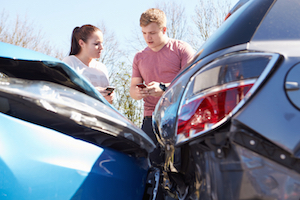Do you know what to do if you find out the at fault driver has no insurance or a deer just jumped at your car? Let Medford Auto Body make it easier for you!
Uninsured/under-insured drivers in accident
If you do end up in an accident with an uninsured driver, they may decide to leave the scene of the accident due to the serious trouble they could be in. For driving uninsured in New Jersey, you could face heavy fines, points on your license, possible jail time, license and registration suspension and the possibility of your car being impounded. This may also be the case for under insured drivers; meaning they do not have enough coverage to pay out the damages to other cars, people or property.
New Jersey requires all motorists to, first, have an insurance policy on their car, basic or not. Then, secondly, to cover uninsured motorists and property in an accident.
About 14% of motorists are not insured in the United States.
What to do at the scene of the accident with an uninsured driver:
 |
| Exchanging information |
- First, call the police like you normally would in any accident and check to see if any parties involved need an ambulance, if able to. Then get to safety if the accident occurred in a busy or bad area. Try not to move the vehicles at all or you could alter the outcome of the situation, unless told to do so by the police. Put your hazards on and, if needed, cones or flares.
- Then, get all their information:
Name, phone number, address, type of car, license plate number, insurance information (if available) and any witness' name and phone number. Taking pictures of your car and, with their permission, the other car(s) involved helps too. Never accept fault while talking to others; that is for the insurance company and police officers to decide.
The police officer will also get this information and put a crash report together, which takes a 7-14 days to become available. So, having it earlier can jump start the repair process. - Contact your insurance company and explain the situation; they will walk you through the process. They will put a claim in under your policy, through your uninsured motorist coverage (UIM). However, you will still have to pay a deductible, regardless of who is at fault. But since it wasn't your fault, it will be noted as a "no fault accident" and will usually not have a rate increase to your policy.
Also, be sure to tell them of any injuries and/or hospital and doctors visits. Given that you have the insurance, your policy will cover some or all of the bills. - Start getting estimates and make arrangements to get your car repaired.

You could try to sue the uninsured driver, but most times they do not have insurance because they can not afford it. Which leaves nothing to be collected if they are successfully sued. Always look out for yourself and make sure you have the uninsured motorist coverage.
If the driver has minimal insurance coverage and cannot cover all the damages they caused through their own policy, you must still submit the entire claim to their insurance company. Then, the remaining balance can be submitted to your insurance company under the UIM coverage.
If you get into an accident with an uninsured driver and it is your fault, your policy still has to pay for their damages. However, the uninsured driver does not have the right to sue you for any damages, in any instance.
Once a person decides to drive without insurance, they give up their
rights to sue.
Deer accident
According to various surveys taken, October, November and December are the months with the highest deer accidents; November taking the number one spot. It's also most common when the sun sets and rises. Remember that deer usually do not travel alone, so always be on the lookout for more deer if you spot one near the road.

A deer/large animal accident is considered a no fault accident on your policy. It's covered under your comprehensive coverage, which also covers things like weather, fire and theft.
What to do after a deer collision:
- Pull to safety, if possible.
- Call the police if the animal is blocking the road, there a multiple cars involved or people are hurt. This also helps with the insurance company.
- Take photos, if possible. This can be extremely useful when dealing with your insurance company.
- Stay away from the animal and check to see if the car is safe to drive.
- Call your insurance company if the vehicle needs repairing. Insurance adjusters and shops writing estimates look for tell tale signs of a deer hit. Hair in the damage is a dead give away, so don't lie to your insurance company about it.

Reminders:
Never touch the animal! You could further harm yourself, your car, passengers or the animal.
Blast your horn if it is "a deer in the headlights" to get it out of the road.

No comments:
Post a Comment